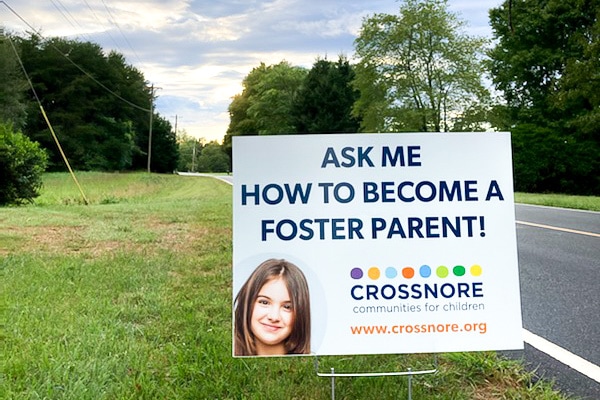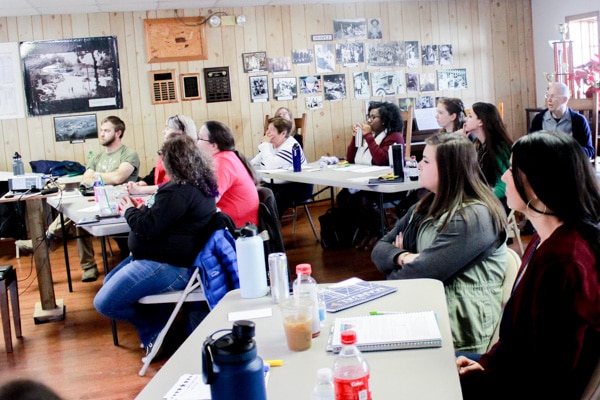So you’ve decided you’re interested in foster care. But you’ve also heard the horror stories about the paperwork and the training. And you don’t know if you have it in you to endure the process. From the outside, it can seem confusing or daunting. Today, we’ll talk about what it actually takes to open your home for foster care.
1. Attend Information Sessions and Find an Agency
Becoming licensed starts with research, or at least a few emails/phone calls. There are actually quite a few agency options out there that families can work with to become foster parents. Every agency has its own strengths and its own culture. In our biased opinion, Crossnore has a lot to offer. Take the time to learn about how different agencies communicate, train, and support their foster families. What do other families who are licensed there have to say?
Many agencies offer regular “open house” style information sessions where you can get the basics, meet some staff, and ask questions. (Learn about Crossnore’s program on the second Tuesday of each month! Register HERE.) Don’t be afraid to talk with or meet with staff individually. Ask questions about what to expect. It is better to have a clear picture of what’s involved so you can make an informed decision about moving forward.

2. Apply to the Program and Receive Preliminary Approval
Once you have chosen an agency you feel good about working with, there will be an initial application. You’ll provide information about your family, your home, and your interests in foster care. (You can apply online to Crossnore’s program HERE.) Agency staff will review your application to make sure that you meet state and agency requirements for fostering. There may be some follow up questions. Don’t be alarmed! We ask a lot of questions of foster parent applicants because it’s our job to get to know families thoroughly throughout the process.
Sometimes families may not meet the requirements for fostering, or at least not right now. There are so many other ways to get involved in helping children and families! Agency staff can share with you some of those opportunities if your role might be something other than fostering for now.
After your application is approved, you will be invited to complete Foster Parent Pre-Service training and begin working on the other pieces of having your home licensed.
3. Attend Required Pre-Service Training
In the state of North Carolina, foster parent applicants are required to attend 30 hours of pre-service training. Most often, this is completed in 10, three-hour meetings. It sounds like a lot. But families find the training incredibly helpful, formative, and it leaves them wanting more! You have the opportunity to learn about the kids and families you’ll work with, learn more about your own family, and figure out what your place might be in the foster care universe.
You’ll be in training classes with several other families interested in foster care, which is a huge plus! Many people build relationships that last for years and are a major source of support as they become foster parents. Foster parent applicants will also complete CPR and First Aid and Medication Administration training, which the agency will help to coordinate.

4. Home Visits and Inspections
You will have a few visits with your licensing worker. There will be at least one visit in the office setting and usually two home visits. Foster care has some specific safety rules for foster homes that will probably be new and maybe a little surprising. We typically do a first home visit to see the home and let families know of any adjustments needed to meet licensing requirements. There is no “white glove” test! We want to see homes that are clean and cared for. But we simultaneously expect that homes are lived in and are comfortable for kids and the family to relax and enjoy the space.
You’ll give staff a tour of your home. Please plan to show all the rooms, closet space, outdoor space, etc. The goal is not to be invasive. The goal is to ensure safety. We know that it does feel invasive sometimes. Remember that the kids coming into your home might not have the same understanding about things that are ok to touch or play with. So there are higher standards for keeping possibly hazardous objects out of reach or locked up. Your worker will let you know of anything that will need to change before your home can pass an environmental safety inspection, which is required for licensure.

As a part of your home visits, your worker will also meet with and interview everyone in the home. Each person over the age of 10 will have to meet with the worker individually. This will be a time where the worker learns more about each member of the family, their history, their personalities, and the different strengths they bring as a member of the foster home. It will be a time to talk openly about how fostering will impact that family. These conversations are one of the ways that the agency gets to know the family and verifies that they are ready to add to the home through foster care. These discussions also help the family ensure they’ve done the exploration and reflection needed. It’s important for families to feel confident about their plans to foster and to understand how it will stretch them.
In addition to the agency visits to the home, each foster home is also required to have a fire safety inspection which is completed by a local fire inspector. Your worker will help you know what to expect and how to prepare for this inspection as well.
5. Licensing Paperwork
The rumors are true! There is a lot of paperwork involved. There will be some written assignments: information about you, your family, and your home that you provide to the agency. Each member of the home also has to provide a medical history and have a medical exam by their primary care provider. Along with some other agencies, Crossnore has an electronic application system which allows you to complete many of your documents online, even from a mobile device! This has the added benefit of easily seeing your progress and keeping documents organized.
Not tech savvy? No problem. Some of us love the feel of a real pen and paper in our hands. Your worker can provide hard copies of documents for you. The families who really fly through their paperwork are the ones who find an organization system that works for them. Make use of the online application portal, or ask your worker for a checklist so you can make a plan and keep tabs on how things are going!
6. Wait (Maybe Not So) Patiently
Once you’ve completed your training, your visits with staff, and turned in all of your paperwork, you’re almost there! Your licensing worker now has the task of pulling all that you’ve done into an application packet to submit to the state. This is like writing a research paper on your family, so it does take some time. Once that’s completed, reviewed, and you’ve signed off, the State will review all of that information. Usually within a couple of weeks, they will notify the worker of any errors or follow up questions they have. Once those are addressed (or if none are identified), your foster home license will be approved! In North Carolina, licenses are valid for two years. Being licensed is what allows you to have foster children placed in your home.
As your license expiration gets closer, if you and the agency agree to continue partnering together, you can relicense for another two years. Relicensing requirements are less intensive and mostly involve updating information.
A Lot but Worth It
Foster Home licensing is an involved process and it takes ongoing effort and commitment. Agencies have a responsibility to make sure that families understand what they are walking into and that they are as prepared as they can be on the front end. We also are responsible for verifying the safety of our foster homes.

If this seems like a bit much, sometimes it helps to think about a special child in your life. If you had to choose a family to care for that child full time, possibly long term, what would you want to know about them? How important would it be to get to know them beforehand? It is a lot, but the well-being of our kids, youth, and families is worth the effort.
We’d love to talk with you if this is something you’re exploring. Don’t hesitate to contact us to learn more!



